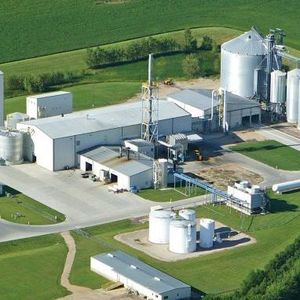Gevo reports post-Butamax settlement operation, financial targets

PHOTO: GEVO
September 23, 2015
BY Gevo Inc.
Gevo Inc. has announced key initiatives and targets for 2016 following the settlement with Butamax in August.
"The settlement with Butamax eliminated a significant cost and uncertainty in our business. We are now in a position to devote the majority of our resources to the commercialization of isobutanol, now that this distraction is behind us," said CEO Patrick Gruber.
Operational and financial targets for 2016 include:
- Increase isobutanol production at Luverne to a range of 750,000 to 1 million gallons in 2016, up 7-10 times from expected 2015 production levels
- Decrease the variable cost of producing isobutanol at Luverne to a range of $3.00-$3.50 per gallon*, a decrease of approximately 50 percent from the current cost of production, enabling isobutanol to be produced at a positive contribution margin, based on an expected average selling price for isobutanol of between $3.50-$4.50 per gallon
- Increase sales of isobutanol into core markets such as the alcohol-to-jet (ATJ), marina, off-road, isooctane and solvents markets
- Achieve an average quarterly corporate-wide EBITDA burn rate (excluding stock-based compensation) of $3.5-$4.5 million per quarter, versus a comparable quarterly burn rate of $6.0 million realized over the first half of 2015
Underpinning the above improvements will be approximately $5.0 million of capital expenditures that Gevo intends to deploy at Luverne over the next 3-6 months. These capital improvements are primarily designed to decrease the cost of production for isobutanol by bringing "in-house" parts of the process that have previously been done by third parties. Key equipment to be installed at the plant include a distillation system to purify isobutanol on-site, an addition to our seed train to allow Gevo to produce its yeast on-site and a stainless steel fermenter to replace one of the existing carbon steel fermenters that has reached the end of its useful life.
Advertisement
The installation of this equipment is expected to significantly decrease Gevo's cost of production of isobutanol, with a goal of producing isobutanol at Luverne at a positive contribution margin in 2016. While Gevo currently has the capability of producing higher isobutanol volumes at Luverne, it has chosen to limit production in 2015 given its existing isobutanol cost structure. Current demonstrated fermentation performance is already believed to be sufficient to achieve Gevo's isobutanol production volume goals in 2016, having already demonstrated yields of 1.80-1.85 gallons per bushel and batch sizes of 16-18 thousand gallons per batch at Luverne. A decrease in production costs resulting from the new capital deployment is expected to enable Gevo to meaningfully increase isobutanol production levels at Luverne without increasing Gevo's cash burn rate.
With additional isobutanol production, Gevo believes it will be in a stronger position to increase sales into its core markets such as the marina, off-road and solvents markets. This increased production is also expected to provide feedstock for Gevo's hydrocarbons biorefinery in Silsbee, Texas, so Gevo can continue to produce jet fuel for testing purposes with commercial airlines, as well as isooctane to meet the growing demand for renewable sources of fuel blend components that do not compromise the performance characteristics of gasoline formulations.
It is also anticipated that producing isobutanol at Luverne at a positive contribution margin will help widen discussions to a larger pool of potential licensees beyond early adopters such as Praj and Porta, given that certain partners require more demonstrated isobutanol production economics prior to moving forward with definitive agreements.
Advertisement
The milestones that were established for 2015 remain on track, namely signing a first binding license agreement, securing ASTM certification for Gevo's alcohol-to-jet fuel and developing further strategic partnerships to propel Gevo's alcohol-to-hydrocarbons business.
"Deploying this capital at Luverne will be an important driver for Gevo's overall growth plans. Throughout 2015, we have been operating Luverne to maximize cash flow from the facility, which has entailed operating the plant for the sole production of ethanol over certain periods of time, with occasional campaigns to produce IBA for market development and sales. The planned capital improvements are expected to drive meaningful costs out of our isobutanol production, which will allow us to increase production rates without driving up our cash burn rate. We believe that increased production and improved economics will greatly facilitate the commercial adoption of isobutanol, both in terms of licensing and product sales," said Gruber.
"The completion of the settlement is a key driver behind the decision to improve Luverne's capabilities. I'm really pleased to be leveraging our stronger balance sheet to spend money on the plant rather than spending it on lawyers," Gruber added.
* Note - Assumes corn price of $3.65 per bushel and nets the value of the isobutanol distiller's grains (the trademarked iDGs)
The company also recently announced a new chairman, after Shai Weiss, past director and chairman, steamed down from the board of directors.
Related Stories
The U.S. Energy Information Administration maintained its forecast for 2025 and 2026 biodiesel, renewable diesel and sustainable aviation fuel (SAF) production in its latest Short-Term Energy Outlook, released July 8.
XCF Global Inc. on July 10 shared its strategic plan to invest close to $1 billion in developing a network of SAF production facilities, expanding its U.S. footprint, and advancing its international growth strategy.
U.S. fuel ethanol capacity fell slightly in April, while biodiesel and renewable diesel capacity held steady, according to data released by the U.S. EIA on June 30. Feedstock consumption was down when compared to the previous month.
XCF Global Inc. on July 8 provided a production update on its flagship New Rise Reno facility, underscoring that the plant has successfully produced SAF, renewable diesel, and renewable naphtha during its initial ramp-up.
The U.S. exported 31,160.5 metric tons of biodiesel and biodiesel blends of B30 and greater in May, according to data released by the USDA Foreign Agricultural Service on July 3. Biodiesel imports were 2,226.2 metric tons for the month.
Upcoming Events










